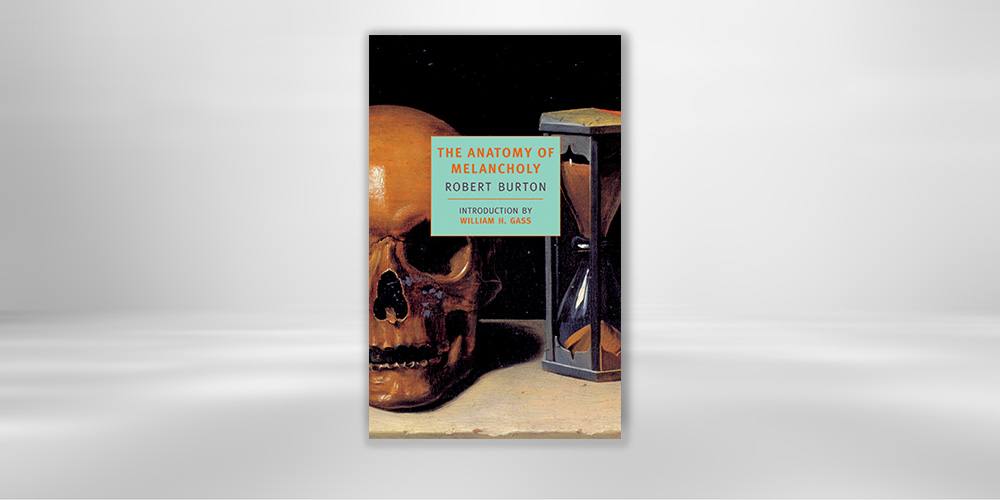In this series, writers present the books they’re finally making time for.
Melancholy is a condition unsuited to a pandemic. Like ennui, it is an ailment born of stability. The strong light of catastrophe withers it. COVID-19 has prevented the indolence melancholy requires, even as its variants—anxiety, panic, vertigo—have bloomed in quarantine. If one is not already longing for melancholy, surely one has begun longing for the conditions in which it was once possible.
Perhaps this is why I’ve finally chosen to read Robert Burton’s The Anatomy of Melancholy after many years of owning it. (I’ve not yet finished it; I’m not sure to what extent anyone can be said to have finished such a book.) “If you will describe melancholy,” Burton writes, “describe a phantasticall conceipt, a corrupt imagination, vaine thoughts and different, which who can doe?” The book sets this pessimism spinning like a top, whirling delightedly over local resentments and cosmic griefs alike. It is a labyrinth of arcane scholarship, obscure quotation, medical ephemera, and earthy shrewdness, all of it tied up with determining the root causes of melancholy. It is not hyperbole to call it one of the primary documents of European culture.
This greatest of medical treatises was written not by a doctor but a reclusive Oxford clergyman. As with Shakespeare, little is known about Burton outside his chief occupation. His contemporary, Anthony Wood, called him “an exact Mathematician, a curious calculator of Nativities, a general read Scholar, a thro’-pac’d Philologist.” The Anatomy of Melancholy, which is presented as a frayed patchwork of texts, is the obvious work of a bibliophile, less original conception than inspired collage. (“Tis all mine, and none mine,” Burton wrote. “Only the method is myne owne.”) It proved a remarkable popular success, going through six printings in Burton’s lifetime. After falling out of print for over a century, it was rediscovered by the Romantic poets—John Keats called it his favorite book—and quickly enshrined as a classic: the tract resurrected as literature.
William Gass has written of the book’s “terminological greed,” a phrase that goes some way in preparing the reader for The Anatomy’s extraordinary surfeit. Burton the anatomist reaches us as a thoroughly modern figure, a gathering of vibrant and contradictory energies. He is a model of inconsistency, equally at home in sense and nonsense, science and superstition, asceticism and sensuality. He apologizes for the length of his digressions only to plunge into yet more. The resultant overgrowth of text is a sort of radiant miscellany; an accumulation of conjecture, proof, rumor, and heresy; endless lists of proper names, foods, herbs, symptoms, profligate et ceteras, disputations, and lengthy essays within essays. Though not itself a novel, Burton’s fabulous act of literary excess prefigures the encyclopedic postwar fictions of the twentieth century—Gravity’s Rainbow, J R, Underworld—in which poetics and technics came together to approximate the informational density of culture.
It is perhaps the least quotable of great books. One no sooner extracts a sentence than one realizes it was load bearing; the whole structure seems suddenly liable to fall. It is best delivered in great slabs of rueful wisdom, its sermon-like weight leavened by mockery and irascible charm. Consider this, from “Causes of Melancholy from the Whole Body”:
No go and brag of thy present happiness, whosoever thou art, brag of thy temperature, of thy good parts, insult, triumph, and boast; thou seest in what a brittle state thou art, how soon thou mayest be dejected, how many several ways, by bad diet, bad air, a small loss, a little sorrow or discontent, an ague, etc.; how many sudden accidents may procure thy ruin, what a small tenure of happiness thou has in this life, how weak and silly a creature thou art.
Or the beginning of the wonderful “Digression of Air,” which Holbrook Jackson has called “the first essay on climatology”:
As a long-winged hawk, when he is first whistled off the fist mounts aloft, and for his leisure fetcheth many a circuit in the air, still soaring higher and higher till he be come to his full pitch, and in the and when the game is sprung, comes down again, and stoops upon a sudden: so will I, having now come at last into these ample fields of air, wherein a I may freely expatiate and exercise myself for my recreation, awhile rove, wander round about the world mount aloft to those ethereal orbs and celestial spheres, and so descend to my former elements again.
Burton’s prose is not prettified. He is no phrasemaker. The joy of reading him comes from the conversational warmth his sentences kindle, the strong sense of a voice talking. It’s a gentle, provisional voice, never remote or pedantic, eager to remain at our elbow. It is the voice of a fellow traveler, familiar with the ailments he describes, having envied, desired, eaten too much, read too many books, sunk into depressions, and felt the marbles rolling dangerously.
Burton’s great intuition is that melancholy is the fundament of human nature—indeed, is itself human nature—a universal condition in whose shared suffering we might find both consolation and a case for more equitable relations:
And who is not a Foole, who is free from Melancholy? Who is not touched more or lesse in habit or disposition? … And who is not sick, or ill-disposed, in whom doth not passion, anger, envie, discontent, fear & sorrow raigne? Who labours not of this disease?
Only a laughing pessimist, a skeptic believer like Robert Burton, could have built to code the creaky, towering, impossibly angled edifice of human consciousness. This grand work of melancholy is also a comedy—not of manners but of minds—a celebration of everything addled, besieged, haunted, or endangered within us. One laughs and moans while reading it, in the dread and delight of recognition, the sounds at last too difficult to tell apart.
Dustin Illingworth is a writer in Southern California.
from The Paris Review https://ift.tt/3eYEUh3

Comments
Post a Comment